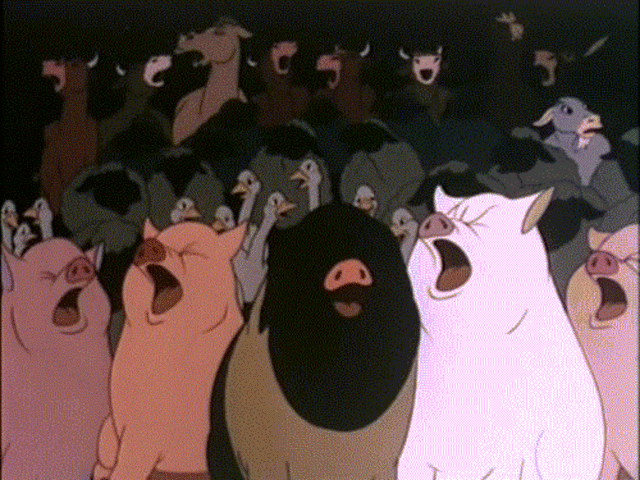Orwell and not good: By George! Most of the British media has only read two Orwell novels...
... and they understood about 50% of what they read

Karaoke at the columnists’ Christmas party (pictured above)
“If there was hope, it must lie in the proles, because only there, in those swarming disregarded masses, eighty-five percent of the population of Oceania, could the force to destroy the Party ever be generated. The Party could not be overthrown from within… Rebellion meant a look in the eyes, an inflection of the voice; at the most, an occasional whispered word.
But the proles, if only they could somehow become conscious of their own strength, would have no need to conspire. They need only to rise up and shake themselves like a horse shaking off flies. If they chose they could blow the Party to pieces tomorrow morning. Surely sooner or later it must occur to them to do it.”
I’ve never seen a columnist quote that bit of 1984. Because in truth, columnists mostly hope the proles stay docile. Columnists in the British press are not there to shake up the status quo, they are there to bolster it. They are there to provide some distraction, the odd little bunfight.
A columnist that seemed likely to change anything would a) not get the job in the first place b) be replaced quite quickly. British political writing is, as I’ve written before, akin to professional wrestling — you get assigned your character and stick to it doggedly, no matter how often you are embarrassed publicly. How else might we explain David Aaronovitch’s career?
Today was the anniversary of the publication of Animal Farm, which came out on August 17, 1945. It was three days after Victory in Japan Day and Orwell has just released a satire about Soviet Russia, a state which, at that febrile moment was still nominally an ally. But, informed by his fighting in the Spanish Civil War, Orwell was already uneasy about Stalin’s bitter flavour of communism. He abhorred the cult of personality and the reign of terror that came with it.
Writing to Yvonne Davet, the French translator of Animal Farm, he described the book as explicitly designed to satirise Stalin ("Un conte satirique contre Staline"). While in "Why I Write" (1946), he wrote that Animal Farm was an attempt "to fuse political purpose and artistic purpose into one whole". Writing to the American radical, Dwight McDonald, in response to criticisms from leftists that he was rejecting all revolutions, Orwell said:
I intended it primarily as a satire on the Russian revolution. But I did mean it to have a wider application in so much that I meant that that kind of revolution (violent conspiratorial revolution, led by unconsciously power-hungry people) can only lead to a change of masters. I meant the moral to be that revolutions only effect a radical improvement when the masses are alert and know how to chuck out their leaders as soon as the latter have done their job. The turning-point of the story was supposed to be when the pigs kept the milk and apples for themselves (Kronstadt). If the other animals had had the sense to put their foot down then, it would have been all right. If people think I am defending the status quo, that is, I think, because they have grown pessimistic and assume that there is no alternative except dictatorship or laissez-faire capitalism.
None of this makes its way into the columns of writers in today’s newspapers who relentlessly quote from 1984 and Animal Farm to imply that it is left-wing people who are the censors and oppressors, despite the right being ascendent in electoral politics and the right-wing being dominant in the press. That’s not surprising.
The columnists who love Orwell now love him in the same way that they briefly loved Keep Calm And Carry On tea towels; he is to be consumed in isolated quotes and confined understandings. If they were to quote the Orwell of revolutionary ideas, of Homage to Catalonia, Road to Wigan Pier and Down and Out in Paris and London they would be incapable of supporting a government that implemented the Universal Credit System and demonises immigrants and the economically disadvantaged with impunity. So, instead, they refer to the half-remembered SparkNotes versions of Animal Farm and 1984 in their heads, burbling about Big Brother and DoubleSpeak, disconnecting any reference from its wider context or Orwell’s actual intention.
It is of no use to the columnists of 2020 to really reflect on the intentions Orwell had when Animal Farm hit bookshelves in 1945 or the fundamental messages of 1984 which came four years later. Were they to do that, they would have to question their political positions and strategic ignorance is their greatest weapon.
Orwell’s words, from Why I Write (1946), are a good summation of what is wrong with British political columnists:
“I cannot say with certainty which of my motives are the strongest, but I know which of them deserve to be followed. And looking back through my work, I see that it is invariably where I lacked a political purpose that I wrote lifeless books and was betrayed into purple passages, sentences without meaning, decorative adjectives and humbug generally.”
The difference is Orwell knew not to stumble into that state. The columnists luxuriate in that fetid state.


